
Institutional rot. That’s the verdict recorded in recent days on the performance of leading institutions by observers not known for pessimistic temperaments or alarmist analysis.
One occasion for such judgments was the testimony of three presidents of eminent universities — Harvard, the Massachusetts Institute of Technology and the University of Pennsylvania — before a House committee on Dec. 6. In response to questions from Rep. Elise Stefanik (R-N.Y.), a Harvard graduate, all three said calls for genocide of Jews might violate university rules, depending on “context.”
That might sound like a principled defense of free speech, however repugnant. But coming from the chief executives of schools that punish teachers and students for being “fat-phobic,” using unwanted pronouns or asserting there are two sexes, it was a double standard at best and at worst an example of how people who are deemed members of oppressor groups are now treated as if they lack the rights and privileges of those deemed members of groups considered oppressed.
“A dark day for American higher education,” ordinarily equanimous economist Tyler Cowen proclaimed in his blog, Marginal Revolution. “They have ended up disgracing their universities, in front of massive audiences (the largest they ever will have?), simply” for maintaining “maximum defensibility for their positions within their universities.”
The hearing prompted the Wall Street Journal’s Walter Russell Mead to post that “the Ivies” — leading universities, though MIT is not in the Ivy League — “reel from the inept performance of their deeply mediocre leaders.” That’s a scalding comment for a writer whose histories are imbued with optimism about the United States.
Meanwhile, historian Niall Ferguson, formerly at Harvard, decries “the willingness of trustees, donors, and alumni to tolerate the politicization of American universities by an illiberal coalition of ‘woke’ progressives, adherents of ‘critical race theory,’ and apologists for Islamist extremism.”
The conduct of leaders of other supposedly intellectually distinguished institutions has also come in for scathing criticism from unlikely quarters.
Statistics expert and self-described liberal Nate Silver called a March 2020 paper — written at the behest of then-National Institute of Allergy and Infectious Diseases Director Anthony Fauci and National Institutes of Health head Francis Collins to discredit the theory that COVID was spread by a leak from the Wuhan, China, laboratory — “a PR exercise rather than an effort to seek the truth.” Amid evidence that Fauci and Collins used their control of federal research funding to downplay Fauci’s culpability for approval of dangerous research in Wuhan, Silver writes the paper “did enormous harm to science and it should be retracted.”
Just as devastating is the description by liberal writers Joseph Nocera and Bethany McLean in City Journal and their book “The Big Fail” as the “unprecedented disaster” of the COVID lockdowns urged, against previous expert consensus, by Fauci and others in government and out.
America’s historic achievements in higher education and public health are worthy of admiration. They were the result of government initiatives and imaginative philanthropy, of the enterprise of gifted people, and the steady work of those operating within functional institutional cultures.
But it is one of mankind’s weaknesses that even in the most functional societies, success breeds failure. Bureaucratic defensiveness tends to overcome founding idealism, and covering one’s anatomy can outweigh intellectual integrity.
As one whose recent book “Mental Maps of the Founders” has just been published, I am struck by the contrast in quality between the leaders of the early republic of 3 million people and the two candidates leading the polls in a mature nation of 333 million.
But the contrast is not limited to candidates. The independent economist Arnold Kling seconds the diagnosis of institutional rot and supplies details.
“The Left is not doing a very good job of maintaining those institutions. Public school enrollment has stagnated, while private school enrollment has increased rapidly (from a much smaller base). Major newspapers have folded. The NYT and WaPo got rich off of Trump-hatred for a while, but more recently their finances have deteriorated. … Higher education as a whole has lost prestige in recent years, and enrollment figures reflect this.”
What we are seeing now is, in Mead’s words, “less the Rise of Trump than the moral and intellectual collapse of the American establishment. Sad. Tragic, really. Scary. But real.”
The response of the liberal institutional leaders is to stand firm in their diatribes against the populist masses. They have taken to arguing that a second Trump administration, unlike the first one, will be an authoritarian dictatorship. They complain, justifiably, about Trump’s attempts to delegitimize the 2020 election result without admitting responsibility and apologizing for their attempts to delegitimize the 2016 election result with the now completely discredited Russia collusion hoax.
They feel morally entitled to run the larger society. But first, they need to clean up their own institutional rot.
Michael Barone is a senior political analyst for the Washington Examiner, resident fellow at the American Enterprise Institute and longtime co-author of The Almanac of American Politics.



